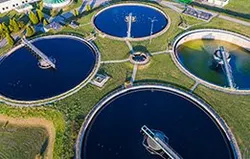
Environmental Engineering: Drinking Water Treatment 
Drinking Water Treatment: This online course covers the principles of environmental engineering for drinking water treatment, including water quality regulations, source water protection, and treatment process design. Students will learn how to design and operate drinking water treatment systems to meet regulatory requirements and protect public health. ▼
ADVERTISEMENT
Course Feature
![]() Cost:
Cost:
Free
![]() Provider:
Provider:
Edx
![]() Certificate:
Certificate:
No Information
![]() Language:
Language:
English
![]() Start Date:
Start Date:
Self paced
Course Overview
❗The content presented here is sourced directly from Edx platform. For comprehensive course details, including enrollment information, simply click on the 'Go to class' link on our website.
Updated in [April 12th, 2023]
This course provides an overview of environmental engineering principles related to drinking water treatment. Students will gain an understanding of the sources, characteristics, and effects of water pollutants, as well as the basic chemical concepts needed to understand how pollutants may change their forms and influence water quality. Additionally, students will learn about the physicochemical processes used at drinking water treatment processes and how they can be used to remove water pollutants and improve the water quality.
[Applications]
The application of this course can be seen in the field of environmental engineering. Students who have taken this course will be able to understand the fundamentals of natural and water environmental systems, the sources and characteristics of water pollutants, and the physicochemical processes used at drinking water treatment processes. They will also be able to apply their knowledge to design and operate drinking water treatment processes, as well as to assess the quality of drinking water. Furthermore, they will be able to develop strategies to protect and improve the quality of drinking water.
[Career Paths]
1. Environmental Engineer: Environmental engineers are responsible for designing, developing, and implementing solutions to environmental problems. They work with a variety of stakeholders to develop strategies to reduce pollution, conserve resources, and protect public health. They also develop plans to monitor and assess environmental conditions, and develop regulations to ensure compliance with environmental laws.
2. Water Treatment Plant Operator: Water treatment plant operators are responsible for the operation and maintenance of water treatment plants. They monitor and adjust the plant's equipment and processes to ensure that the water is safe to drink and meets all applicable regulations. They also perform regular maintenance and repairs on the plant's equipment.
3. Water Quality Analyst: Water quality analysts are responsible for testing and analyzing water samples to determine the presence of pollutants and other contaminants. They use a variety of laboratory techniques to identify and quantify pollutants, and develop strategies to reduce their impact on the environment.
4. Environmental Consultant: Environmental consultants are responsible for providing advice and guidance to businesses and organizations on environmental issues. They assess the environmental impact of proposed projects, develop strategies to reduce environmental risks, and provide advice on how to comply with environmental regulations. They also provide training and education on environmental issues.
[Education Paths]
1. Bachelor of Science in Environmental Engineering: This degree program focuses on the application of engineering principles to the protection and management of the environment. Students will learn about the principles of environmental engineering, including water and air pollution control, hazardous waste management, and environmental health and safety. They will also gain an understanding of the legal and regulatory aspects of environmental engineering, as well as the principles of sustainability.
2. Master of Science in Environmental Engineering: This degree program provides advanced training in the principles of environmental engineering, including water and air pollution control, hazardous waste management, and environmental health and safety. Students will gain an understanding of the legal and regulatory aspects of environmental engineering, as well as the principles of sustainability. They will also learn about the latest technologies and techniques used in environmental engineering, such as green engineering, renewable energy, and water resource management.
3. Doctor of Philosophy in Environmental Engineering: This degree program provides advanced training in the principles of environmental engineering, including water and air pollution control, hazardous waste management, and environmental health and safety. Students will gain an understanding of the legal and regulatory aspects of environmental engineering, as well as the principles of sustainability. They will also learn about the latest technologies and techniques used in environmental engineering, such as green engineering, renewable energy, and water resource management.
4. Master of Engineering in Environmental Engineering: This degree program provides advanced training in the principles of environmental engineering, including water and air pollution control, hazardous waste management, and environmental health and safety. Students will gain an understanding of the legal and regulatory aspects of environmental engineering, as well as the principles of sustainability. They will also learn about the latest technologies and techniques used in environmental engineering, such as green engineering, renewable energy, and water resource management.
Course Provider

Provider Edx's Stats at AZClass
Drinking Water Treatment: This online course covers environmental engineering principles for drinking water treatment, including water quality regulations, source water protection, and treatment process design. Students will learn how to design and operate drinking water treatment systems to meet regulatory requirements and protect public health and this course enables learners to understand the sources, characteristics and effects of water pollutants. They also gain an understanding of the basic chemistry concepts needed to understand how pollutants change their form and affect water quality. In addition, learners can learn about the different physicochemical processes used in drinking water treatment and how these processes are used to remove water pollutants and improve water quality.
Discussion and Reviews
0.0 (Based on 0 reviews)
Explore Similar Online Courses

Free Interviewing Skills Tutorial - Job Interview Skills Training Course

Linux Basics: The Command Line Interface - 6

Python for Informatics: Exploring Information

Social Network Analysis

Introduction to Systematic Review and Meta-Analysis

The Analytics Edge

DCO042 - Python For Informatics

Causal Diagrams: Draw Your Assumptions Before Your Conclusions

Whole genome sequencing of bacterial genomes - tools and applications

Educating for Sustainable Development (ESD) in Schools and Universities

Potable water treatment


Start your review of Environmental Engineering: Drinking Water Treatment